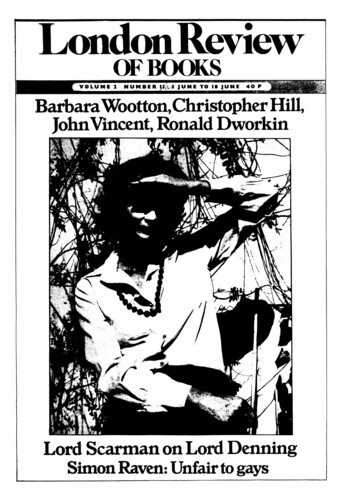This, the companion volume to The Discipline of Law, completes Lord Denning’s current legal testament – his witness, until his next book, to the cause of justice. He writes on difficult questions of law for the pleasure of ordinary folk: and he succeeds. Yet, for all his racy style (its brevity and bravura could serve as a model for journalists), and notwithstanding his sense of mischief and love of fun, he has produced a serious contribution to the legal study, critical in our time, of the role of the judge in the public life of a common law country.
Lord Denning’s article of faith is best described by the old Latin tag: boni judicis est ampliare jurisdictionem. He has devoted his judicial career, which now spans one-third of a century, to extending the range of the judge’s function in English, and, indirectly, British, society. In this volume, he looks at the part he has played in widening the range and increasing the effectiveness of the courts in five branches of the law – contempt of court, administrative law, liberty of the subject, commercial law and family law. The ‘golden thread’ of his argument (to borrow the phrase Lord Simon used to describe the accused’s benefit of the doubt in criminal cases) is that, if left to themselves, the courts can, under Lord Denning’s kindly tutelage, solve the problems and do justice. He has a good case, as Due Process shows. His name will always be associated with the development of judicial remedies to control the post-war proliferation of government agencies, central and local, which have been imposed upon individual citizens ostensibly for their benefit. He has shown great ingenuity in forwarding the growth of new remedies to restrain the abuses of international trade, the immunities of sovereign states which themselves conduct trading operations, and the activities of the pirates who prey on other people’s performing rights. Read what he says about the ‘Anton Piller’ order (p. 123) and the ‘Mareva injunction’ (pp. 134 et seq.), and you will see him in action.
But this is no more than the tantalising efflorescence of a legal mind whose roots go deep into the law which he loves. He is a true professional. His originality is no substitute for sound learning and scholarship. On the contrary, it is possible precisely because he knows so much, and remembers what he knows. You have to have a confident mastery of your subject to take on the House of Lords (in its judicial capacity, our supreme court), and sometimes to win. Even his defeats are often no more than tactical: for, after losing the battle, he can win the campaign, as he did with ‘the deserted wife’s equity’, the tale of which he tells in Part Seven.
This story, however, also illustrates the limits to judicial power, even when exercised by a dynamic judge of genius. Lord Denning attempted to create by judicial decision a right of property for the wife in the matrimonial home. He had to tackle head-on our established law of property. The House of Lords saw the far-ranging difficulties of the enterprise: difficulties which would present building societies, banks, purchasers for value and many others with problems which had to be solved, if the law was to remain certain in its application and reasonably clear. A judge, sitting in court and hearing only the people concerned with the particular case, cannot grapple with such a wide range of problems. He may even be unaware that they exist: he will certainly be unable to explore their implications. Reforms of this magnitude require legislation. Parliament can ensure that it is properly advised and that its Bill is fully considered and subject to wide-ranging consultation. And its committee process – the ordeal by fire through which every legislative proposal has to pass – means that every line of the Bill can be fought over, and, if necessary, amended.
In one respect, therefore, the book is misleading. The judicial process it describes is not ‘the due process of law’ but only a part of it. Lord Denning seriously underrates the importance both of the Law Commission, which has the continuing duty of keeping the law under review with a view to its reform, and of the legislative process whereby the advice of the Law Commission, and others, is available to Ministers and Members of Parliament. The danger is lest we be misled by the siren-sweetness of his story into believing that the judges can offer us more than the forensic process can stand. As another great lawyer, Lord Devlin, has pointed out, the British wish neither to be judged by governments nor to be governed by judges.
Nevertheless, we, and posterity, are fortunate that the greatest judge of our time has given us in these two enchanting volumes a sketch of himself in action. The post-war years I once described as the age of law reform, legal aid and Lord Denning. None of these would have been effective without the other two. They needed each other: and together they have established a memorable era in the long history of English law.
Send Letters To:
The Editor
London Review of Books,
28 Little Russell Street
London, WC1A 2HN
letters@lrb.co.uk
Please include name, address, and a telephone number.

